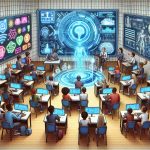As educational institutions grapple with teacher shortages, artificial intelligence (AI) emerges as a potential solution. A prominent private school in London is pioneering the integration of AI tools, including popular platforms like ChatGPT, to offer tailored educational experiences. The school’s head, John Dalton, emphasizes that this innovative approach adapts to each student’s unique learning pace.
Students will not only benefit from AI-driven customization but will also receive guidance from three dedicated educational coaches. This dual support system aims to enhance students’ engagement with subjects and encourages them to ask questions that might go unaddressed in traditional classroom settings. Furthermore, the use of AI facilitates time management, allowing students to cultivate essential life skills such as critical thinking, digital literacy, and entrepreneurship. Dalton highlights a focus on diverse areas including public speaking and self-expression.
Reactions to AI in teaching vary widely. Some educators express optimism about AI’s ability to alleviate teachers’ workloads and accommodate larger class sizes, while others maintain a cautious stance. Hadida Grabow from the Higher Learning Group acknowledges AI’s supportive role but asserts that it cannot replace the value of high-quality human instructors.
Nevertheless, challenges persist in successfully implementing AI in educational contexts. An example is the failed AI chatbot initiative in the Los Angeles Unified School District. Despite these hurdles, Dalton remains confident that their experimental program will provide a supportive, judgment-free learning environment, allowing students to thrive at their own pace. This exploration of AI suggests a promising shift, particularly for private education, while highlighting its potential role in addressing teacher shortages in public schools.
Artificial Intelligence: A New Frontier in Personalized Education
As educational institutions embrace new technologies, artificial intelligence (AI) is becoming a significant player in personalizing education. The landscape of personalized learning has evolved, presenting not only innovative strategies but also complex challenges that warrant examination.
What are the fundamental advantages of AI in personalized education?
AI promotes individualized learning experiences that adapt to students’ needs. Intelligent systems can analyze vast amounts of data to determine a student’s learning style, pace, and proficiency. This level of customization allows for tailored lesson plans and assessments that can continually adjust based on performance and engagement, creating a more responsive learning environment.
What key challenges and controversies exist regarding AI in education?
While the potential is considerable, several challenges complicate the integration of AI in education. One significant concern is data privacy. With AI systems collecting student data to customize learning, the security of this data becomes paramount. Parents and educators worry about how data is stored and used, raising ethical questions about surveillance and consent.
Another critical challenge is the digital divide. Not all students have equal access to technology or support to utilize AI effectively. This disparity could exacerbate existing inequalities in education, potentially leaving behind those who are already disadvantaged.
Furthermore, there is an ongoing debate regarding the role of teachers in an AI-driven classroom. While AI can assist in reducing administrative burdens, critics argue that it may undervalue the human elements of teaching—empathy, encouragement, and social interaction—essential for holistic education.
What are the disadvantages associated with AI in education?
Despite its advantages, the reliance on AI also poses certain disadvantages. Over-dependence on technology could diminish critical thinking and problem-solving skills among students. If students become accustomed to AI providing them with answers and solutions, they may struggle to develop these essential skills independently.
Moreover, AI systems can perpetuate biases present in their programming and underlying data. If AI training sets are not adequately diverse, they can lead to unequal educational outcomes, impacting students from different backgrounds.
What are some valid educational platforms leveraging AI today?
Many online learning platforms are now utilizing AI for personalized education. For instance, platforms like Khan Academy offer personalized learning pathways and insights based on student performance analytics. Similarly, edX provides learners with adaptive learning technologies that cater to individual educational needs.
In conclusion, while AI represents a new frontier in personalized education, its implementation necessitates careful consideration of ethical implications, potential biases, and the human elements vital to effective teaching. The journey towards integrating AI in education is still unfolding, and a balanced approach will be crucial in maximizing its potential while mitigating its risks.






















